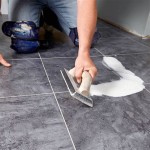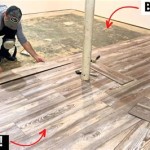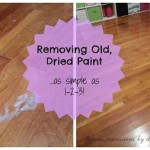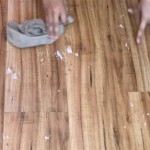Is Vinyl Flooring Safe for Bathrooms?
Vinyl flooring has become increasingly popular for bathrooms due to its durability, water resistance, and affordability. However, homeowners may wonder if vinyl flooring is safe for bathrooms and can withstand the unique demands of this moisture-prone space.
The answer is yes, vinyl flooring is generally safe for bathrooms when properly installed and maintained. Here are some essential aspects to consider:
Water Resistance
One of the crucial factors when choosing flooring for bathrooms is water resistance. Vinyl flooring excels in this area as it is made of synthetic materials that resist water penetration. This makes it ideal for areas prone to spills, moisture, and occasional water exposure.
However, it is important to note that not all vinyl flooring is created equal. Luxury vinyl tiles (LVT) and vinyl plank flooring (VPF) have the highest water resistance due to their dense construction and waterproof core.
Slip Resistance
Bathroom floors can become slippery when wet, increasing the risk of accidents. Vinyl flooring can be designed with a textured or embossed surface to enhance slip resistance. This feature is especially important in areas like showers and near bathtubs.
Look for vinyl flooring with a high coefficient of friction (COF) rating, which indicates its slip resistance. A COF rating of 0.5 or higher is considered safe for wet areas.
Durability
Bathrooms experience heavy foot traffic and exposure to moisture, which can affect flooring durability. Vinyl flooring is renowned for its resilience and can withstand the wear and tear of everyday use.
LVT and VPF are particularly durable, with thick wear layers that protect against scratches, dents, and stains. They can also resist fading and discoloration caused by UV rays.
Maintenance
Vinyl flooring is relatively easy to clean and maintain. Regular sweeping or vacuuming removes dirt and debris, while mopping with a mild cleaning solution helps keep it hygienic.
Avoid using harsh chemicals or abrasive cleaners, as these can damage the flooring's surface. Some vinyl flooring options may require occasional polishing or waxing to maintain their luster.
Installation
Proper installation is critical to ensure the safety and longevity of vinyl flooring in bathrooms. Professional installation is recommended to prevent water damage or other issues.
The subfloor should be level, dry, and free of imperfections. Vinyl flooring can be installed using adhesive, click-lock systems, or loose-lay methods, depending on the type of flooring.
Conclusion
Vinyl flooring is a safe and practical option for bathrooms when properly installed and maintained. Its water resistance, slip resistance, durability, ease of maintenance, and affordability make it an excellent choice for this high-moisture environment.
By choosing high-quality vinyl flooring and following proper installation and maintenance guidelines, you can enjoy a beautiful and safe bathroom floor for years to come.

What Is The Best Flooring For Bathrooms Tarkett

Vinyl Planks In Bathrooms Residential Inspiration Flooring

Luxury Vinyl Flooring Is A Great Choice For Chic Bathrooms

Dos And Don Ts For Installing Vinyl Plank Floors In The Bathroom Advice Homeowners

Best Vinyl Flooring For Bathrooms

Luxury Vinyl Flooring What Is It And Any Good Melanie Lissack Interiors

Best Bathroom Flooring Options

Waterproof Vinyl Flooring Guide Msi Surfaces

The Pros Cons Of Bathroom Flooring Options Carpet Court

Is Vinyl Plank Flooring Waterproof Twenty Oak
See Also







